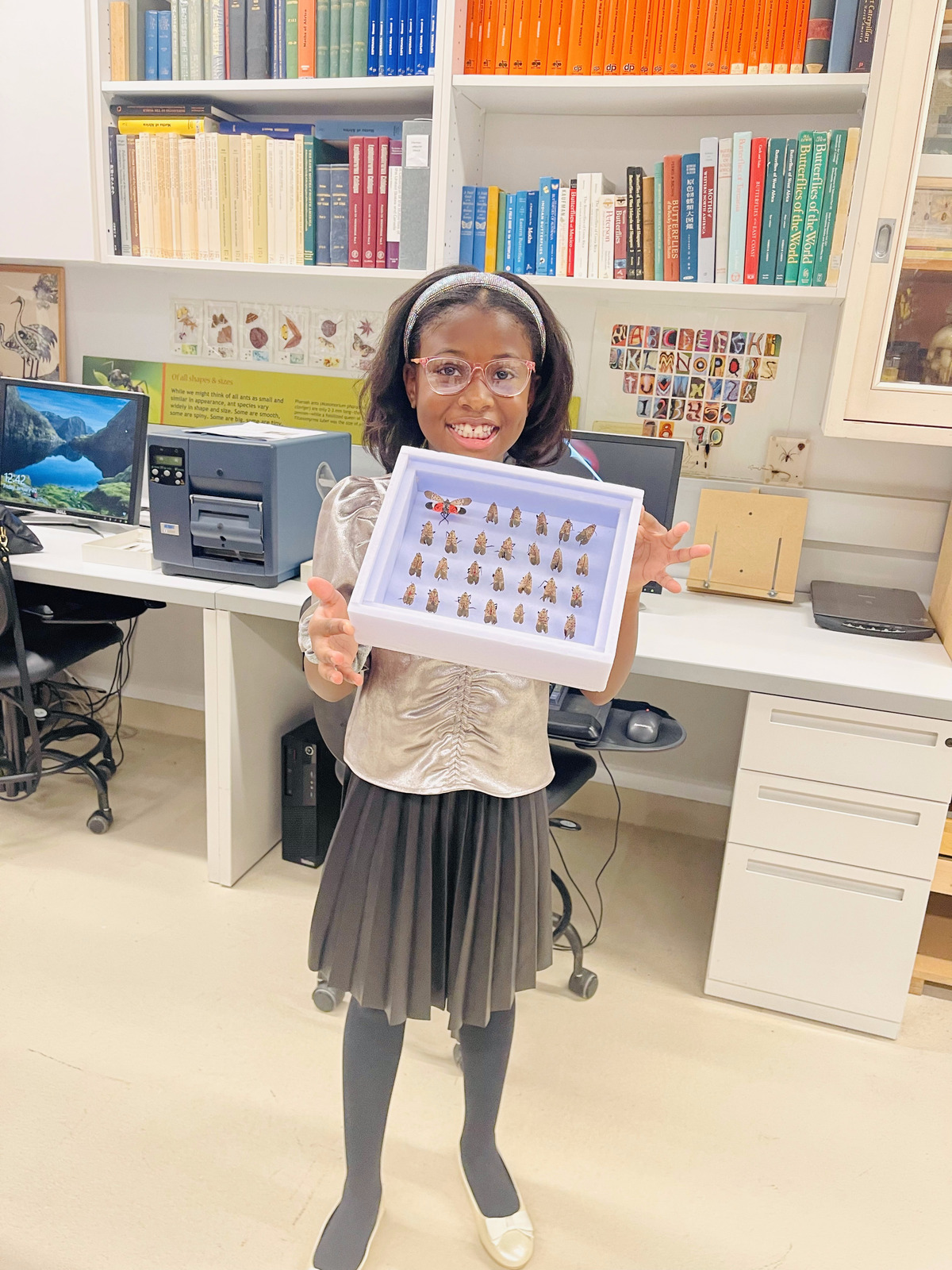Yale honors nine-year old scientist Bobbi Wilson for lanternfly donation
Nine-year old Bobbi Wilson, who toured Yale labs after a viral racial profiling incident, returned to Yale for a ceremony celebrating her lanternfly donation to the Peabody Museum.

Colin Poitras
Nine-year-old Bobbi Wilson of Caldwell, New Jersey, is one of the Peabody Museum’s youngest collectors.
A lover of “potions,” Bobbi mixed her lanternfly-fighting formula — apple cider vinegar, dish soap and water — scoured the trees of New Jersey and caught the Peabody’s first-ever U.S.-based spotted lanternflies.
On Jan. 20, members of the Yale community gathered alongside Bobbi’s friends and family at the Yale School of Public Health to celebrate the addition of Bobbi’s lanternfly collection to the museum’s database, recognizing her permanent mark as a donor scientist at Yale. Ijeoma Opara, assistant professor of social and behavioral sciences, organized the event after originally hosting a science tour for Bobbi back in November.
“I hope it sends a message to allow Black children to not only be children, but really nurture their brilliance, nurture their strengths,” Opara said. “I think we all have a duty in our society to be able to create these safe spaces for children [because] once you give children the space to thrive, they can do wonderful and amazing things.”
Known affectionately as “Bobbi Wonder” by family and friends, Bobbi has inspired many with her dedication to the environment and her curiosity about science.
Bobbi had been spraying a formula on trees to help exterminate spotted lanternflies, an invasive species in New Jersey, when her neighbor reported her to the police. Bobbi made national headlines after this Oct. 22, 2022 incident, which sparked discourse around the weaponization of the police against Black children.
“You hear about racism,” Monique Joseph, Bobbi’s mother, said. “You kind of experience it in your peripheral vision. If you’re lucky in your life, it doesn’t come knocking on your door. That morning when it happened, my world stopped.”
Upon learning about the incident, Opara designed a tour to introduce Bobbi to Black female scientists at Yale and show support for Bobbi’s love for science. Bobbi, with budding interests in the environment and medicine, was exposed to lab mice, an insectary and other glimpses into the world of science.
At the event, Joseph spoke on how incidents of racial profiling can harm young children’s ambitions. She made a promise to not let Bobbi “lose her steam for STEM,” and thanked Opara for her part in changing the trajectory of Bobbi’s traumatic experience.
“Dr. Opara, you have been a blessing, you are part of our testimonial [of] what it means to have a community of amazing, beautiful Black scientists and doctors,” Joseph said. “And more important than all of that is your heart. It’s your passion for the work that you do, … and your number one goal was to make sure that Bobby did not have October 22 as the memory that it started out as being.”
Opara said it was beautiful to see a packed room honoring “a nine-year-old Black New Jersey girl.” Among the attendees included researchers from Opara’s lab and the Black Postdoctoral Association; Trace Kershaw, chair of the department of social and behavioral sciences at YSPH; and state representative Robyn Porter.
Porter, who grew up with Joseph, noted the necessity of encouraging young children to be their authentic selves and giving hope to a community that has struggled. She emphasized the importance of those with access to power, such as educators at prominent universities, using their platform to inspire the next generation.
“It was symbolic of lifting as we climb,” Porter said. “[Opara] used that platform to elevate this young Black girl in a way that only she could, to turn something that was traumatizing into something that was really a manifestation.”
Entomology Collections Manager Larry Gall and the Peabody’s Assistant Director of Student Programs Nicole Palffy-Muhoray GRD ’16 presented an exhibition of Bobbi’s lanternflies to audience members. The event also included a slideshow of messages from Bobbi’s mother and father, family friends, school administrators and other supporters.
Gall originally offered Bobbi the opportunity to donate lanternflies during the tour, noting her interest in the entomology collection. Bobbi’s lanternflies are now tools for future study, able to be requested by researchers for a variety of purposes such as genetics research. For example, a common request is to take the leg off of a butterfly or moth specimen for DNA analysis, according to Gall.
“The reason that Bobbi is here and we’re not grieving is because someone above wanted us to be a part of changing racism in our town,” Joseph said. “I don’t just speak up for Bobbi … I spoke up for anyone who checks that ‘other’ box, that has racism against them, biases against them.”
The Peabody’s Division of Entomology collections include butterflies and moths, beetles, dragonflies and other species.







